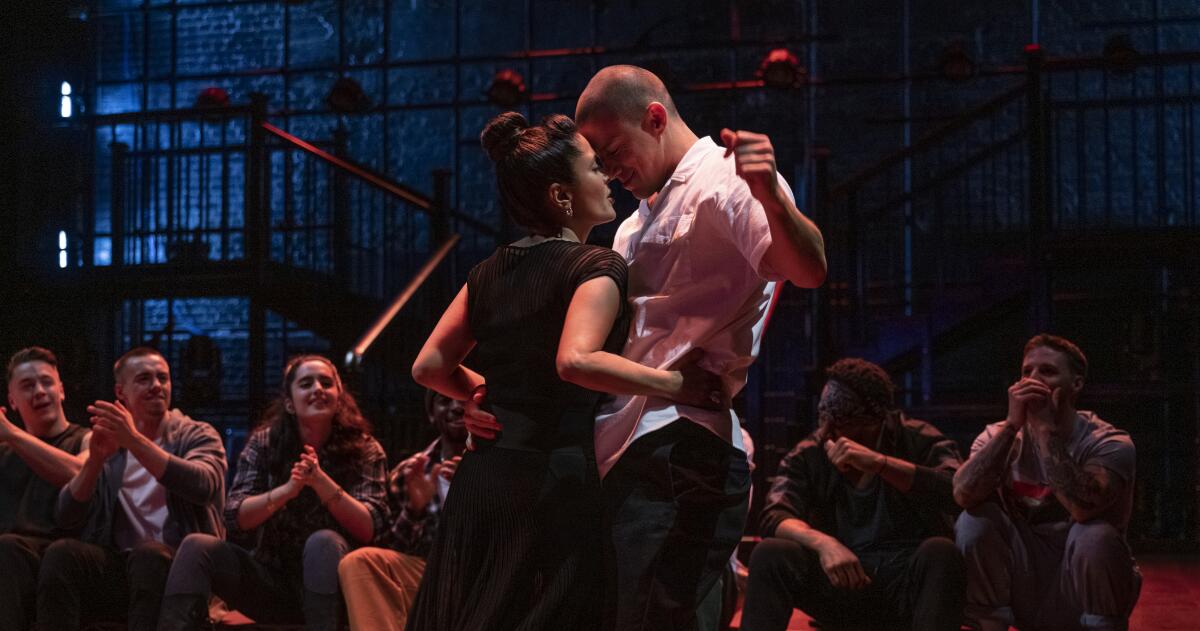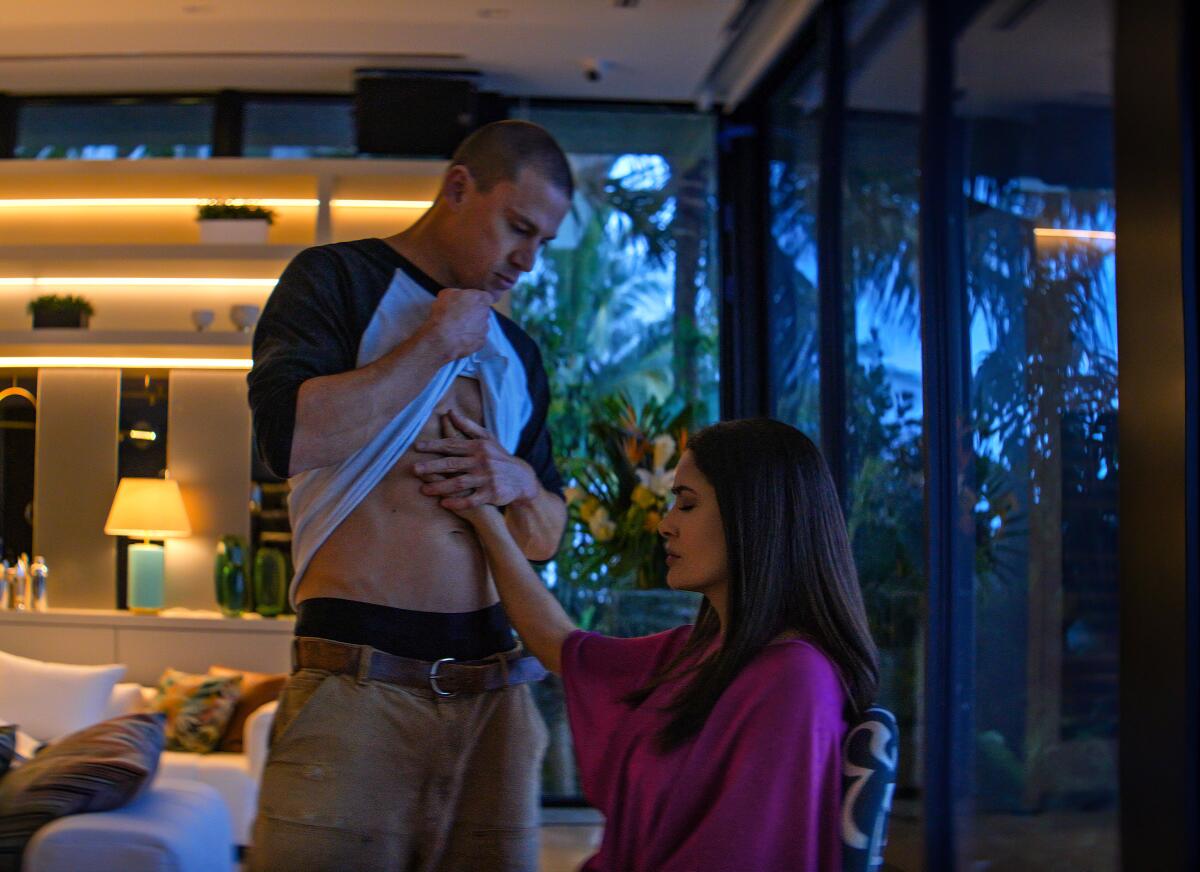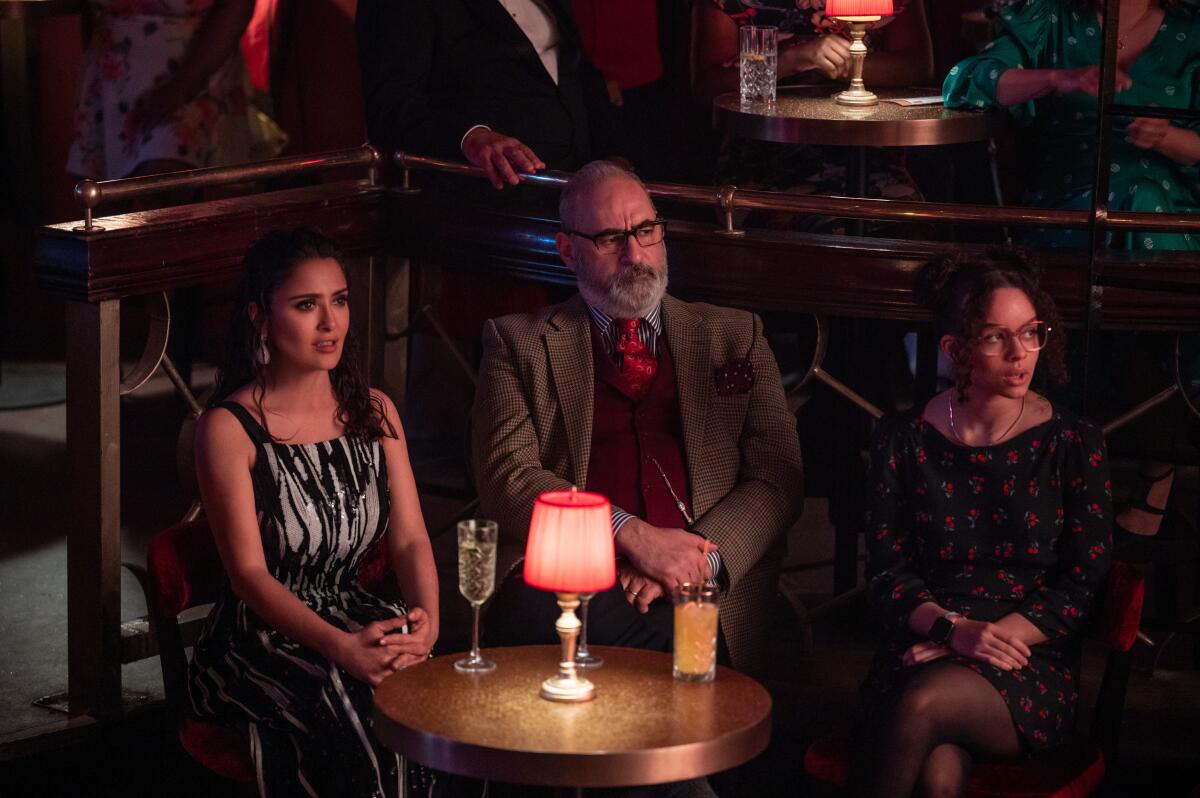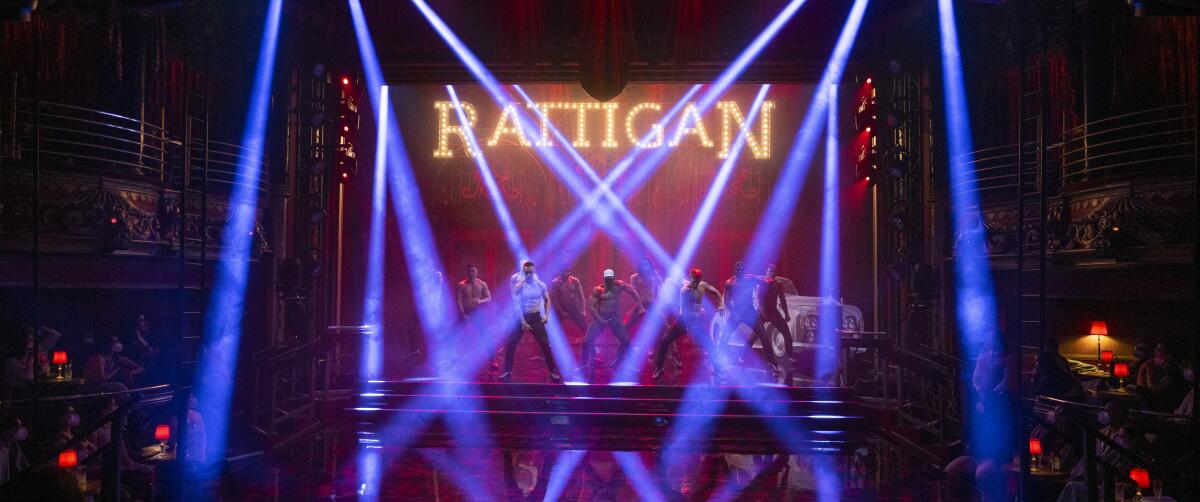‘Magic Mike’s Last Dance,’ a sweetly romantic sequel, doesn’t quite stick the landing

- Share via
Mike Lane is now a bartender. His custom furniture company went belly-up during the pandemic, and so there he is, mixing drinks at a swanky Miami charity event, when he meets Maxandra Mendoza (Salma Hayek Pinault), an embattled London socialite on the verge of a messy divorce. She could use some distraction, and Mike, she learns, happens to have one up his sleeve, among other soon-to-be-divested pieces of clothing. After some coaxing and negotiating, plus a little soul-searching, he gives Maxandra what starts as a private lap dance and soon morphs into a hypnotic home-gymnastics routine, complete with bars and beams (mainly hers), if also one hell of a tricky dismount. Maxandra, floored by Mike’s passion and artistry, isn’t ready to let him slink away.
Clearly, Hollywood isn’t either. “Magic Mike’s Last Dance” is the third feature about a Florida stripper played by a perfectly cast Channing Tatum, and its title — which could be interpreted as a death knell for the franchise or for Mike himself (don’t worry, he lives) — is best understood as the continuation of a series-long joke. From the moment we first met him more than a decade ago, Mike has been what you might call an unenthusiastic ecdysiast, forever on the verge of retiring his thong-and-dance routine. His abundant gifts — for shaking his hips, baring his abs and sending the ladies and more than a few gentlemen into paroxysms of pleasure — were matched only by his apparent desire to be doing anything else for a living.
For your safety
The Times is committed to reviewing theatrical film releases during the COVID-19 pandemic. Because moviegoing carries risks during this time, we remind readers to follow health and safety guidelines as outlined by the CDC and local health officials.
That made him something of a reluctant hero for our times, though one of the revelations of this unexpectedly elastic series is that every era gets the “Magic Mike” movie it deserves. The first one, as directed by Steven Soderbergh, mixed playful fantasy with a chaser of hard reality; it was both a sly showcase for Mike’s attributes and a jaundiced snapshot of a tough postrecession moment. The exuberantly entertaining “Magic Mike XXL” (2015), made by Gregory Jacobs (with Soderbergh serving as cinematographer and editor), was a blast of pure, unfiltered pleasure, one that reflected the broader, more variegated appetites of the moviegoing public.
Eight years later, that public has dwindled, and “Magic Mike’s Last Dance,” which plants Soderbergh back in the director’s chair, is lucky to see the inside of a theater at all. Originally planned as an HBO Max streaming release (like Soderbergh’s midpandemic features “Let Them All Talk,” “No Sudden Move” and “Kimi”), it will begin playing in theaters nationwide this pre-Valentine’s Day weekend, perhaps in hopes of drawing some of the girls-night-out crowds that greeted the first two, to say nothing of the “Magic Mike Live” shows that have opened to raucous success in London, Las Vegas and Miami. Clearly there’s a large, hot-blooded audience for this brand of erotic spectatorship, even if you wouldn’t necessarily know it from mainstream American movies, which have become a depressingly sexless, seduction-free zone by comparison.

The new movie positions itself as a corrective to that state of affairs, if also a surprisingly wholesome one. If the first two films (written, like this one, by Reid Carolin) celebrated the fleeting transactional encounter, “Magic Mike’s Last Dance” casts a quizzical eye in the direction of long-term romance. Admirably ambitious if conceptually muddled, it short-circuits a lot of those signature “Magic Mike” pleasures — including some of the lust, and a lot of the laughs — and signals its headier ambitions with a dramatic shift in scenery. After that sensuous prologue, the story whisks us across the Atlantic, where Mike uneasily embraces a new London calling as Maxandra’s houseguest and trial employee.
He’s the new artistic director at the Rattigan Theatre, a family-owned establishment that Maxandra acquired as part of her separation agreement. This handsome if fusty-looking venue (played by London’s Clapham Grand music hall) has never hosted a strip show, but Maxandra sees revenge as a dish best served hot: Eager to annoy her soon-to-be-ex-husband (Alan Cox) and inflame his jealousy, she believes the theater could benefit from a little of Mike’s va-va-voom vision. So could the play that’s about to open there, “Isabel Ascendant,” a limp-looking Regency drama about a young woman deciding whether to marry for money or love.
Maxandra herself made that choice long ago, and with the new-and-improved “Isabel,” she intends to present her female audiences with a more satisfying and subversive third option. Her goal, to create a delirious spectacle that places women’s wants front and center, is transparently the movie’s as well. The success of this enterprise will rest heavily on her own smarts and gumption, and Hayek Pinault, having navigated her own Hollywood career arc from sex symbol to skilled actor to shrewd entrepreneur, could hardly be more persuasive as a woman at ease with her authority. At the same time, Maxandra can only realize her ambitions by trusting Mike’s instincts and expertise, and “Magic Mike’s Last Dance” becomes both a celebration of female desire and a bracing vision of gender parity in action.

It also becomes a few other things, namely a light riff on “Sunset Blvd.,” a wry upstairs-downstairs comedy, with key wisecracking support from Maxandra’s all-knowing valet (Ayub Khan Din) and her sardonic teenage daughter, Zadie (Jemelia George). It’s Zadie who writes and delivers the movie’s narration, an arch, distancing rumination on the nature of dancing that signals from the outset that we’re not in Tampa anymore. Instead we’re in a loose-limbed backstage melodrama, in which the gleeful lasciviousness of the original movie, with its penis pumps and fireman costumes, gives way to an infectiously sweet let’s-put-on-a-show energy.
Isabel’s desires are given shape and voice by a game female lead (Juliette Motamed, “We Are Lady Parts”), who in turn is backed by a rag-tag troupe of gifted male dancers, none of whom have doffed for dollar bills before. The task of recruiting these actors, and of negotiating the logistics of stage risers and staging permits, may remind you of the mechanics of Soderbergh’s “Ocean’s” trilogy, especially when a local official (Vicki Pepperdine, injecting life and warmth into a buttoned-up stereotype) becomes the mark in a too-brief bureaucratic heist sequence. The routines themselves, choreographed and cut together with Soderbergh’s usual fluidity, might remind you of the dance moves from Tatum’s “Step Up” movies — a nice reminder of how much his own personal and professional history have shaped this story.
The Rattigan show comes together eventually, even if the movie takes somewhat longer. Apart from one throwaway online reunion scene, the absence of Tatum’s “Magic Mike” co-stars (Matt Bomer, Adam Rodriguez, Kevin Nash and Joe Manganiello) is sorely felt, and while the show’s up-and-coming young dancers are all gifted performers, Soderbergh and Carolin haven’t given them much in the way of dialogue or personality. That’s disappointing, if also deliberate. Mike is less a dancer this time around than a mentor, and even a body as chiseled as his has its limits. He can still gyrate, thrust and hurl himself across a rain-swept stage, but his glory days as a bachelorette-party attraction are firmly behind him, which is a source of both obvious relief and unmistakable melancholy.

And so it makes a certain sense that the boisterous male camaraderie that buoyed the first two movies should recede into the rear-view mirror. “Magic Mike’s Last Dance” looks anxiously and a bit sadly to the future, and also to the awkward, endlessly fraught state of heterosexual relations in the early 21st century — a condition that Tatum and Hayek Pinault explore through their own tricky dance of dependency and desire. Their chemistry as actors is seldom in doubt, even if the fate of their characters, testing out a relationship marked by differences of age, money, background and power, very much is.
“No happy endings,” Maxandra warns Mike before that first Miami dance — a winking euphemism that raises an entirely sincere question about their long-term prospects. She may become his boss and benefactor, but their viability hinges on their seeing each other as not just romantic ideals but also creative equals. The movie walks a half-ponderous, half-intriguing tightrope: Can Mike’s talents as a male entertainer finally become both a legitimate source of professional satisfaction and an expression of ardent, unfeigned desire? That may be the most far-fetched of fantasies — but maybe, this movie imperfectly but touchingly suggests, those are the only ones worth chasing.
‘Magic Mike’s Last Dance’
Rating: R, for sexual material and language
Running time: 1 hour, 52 minutes
Playing: Starts Feb. 10 in general release
More to Read
Only good movies
Get the Indie Focus newsletter, Mark Olsen's weekly guide to the world of cinema.
You may occasionally receive promotional content from the Los Angeles Times.











